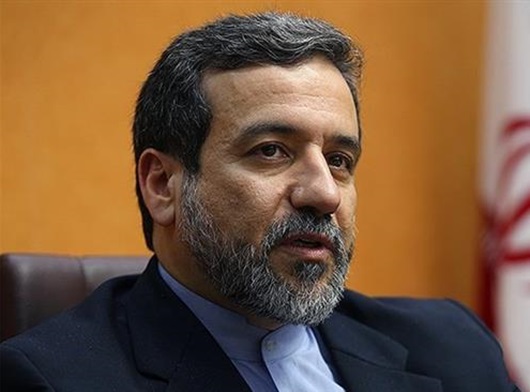Speaking to BBC in London, Araqchi said the situation in Syria is “very complicated” amid growing concern that a wider regional war could erupt.
“Fear of war is everywhere in our region,” Araqchi told the BBC’s chief international correspondent Lyse Doucet.
Araqchi said that Iran’s presence in Syria was not aimed at creating a new front against the Israeli regime, but to fight terrorism.
“Just imagine if we were not there. Now you would have Daesh [the ISIS group] in Damascus, and maybe in Beirut and other places,” the deputy minister said.
BBC says Araqchi has deplored the suffering in the Damascus suburb of Ghouta where scores of lives have been claimed by the Syrian army’s attacks on terrorists’ positions.
Eastern Ghouta is included in a deal between Turkey, Russia and Iran to establish de-escalation zones in Syria with the aim of reducing violence in the war-torn Arab country.
The so-called Syrian Observatory for Human Rights, a pro-opposition monitoring group, claimed that at least 250 civilians had been killed in the attacks.
Earlier in the week, Russian Foreign Minister Sergei Lavrov blamed “armed provocations” by Takfiri al-Nusra Front militants for the situation in Eastern Ghouta, which according to Moscow is a “critical humanitarian and socio-economic” one.
Elsewhere in his interview with BBC, Araqchi added that Iran-backed forces such as Lebanon’s Hezbollah resistance movement existed to confront Israel.
He also refused to confirm that Iran had sent a drone into Israeli airspace from Syria earlier this month. He said the drone, which Tel Aviv claims was of Iranian origin, belonged to the Syrian army.
This week Israeli Prime Minister Benjamin Netanyahu brandished what he said was part of the drone at a security conference in Munich and said Iran was the “greatest threat to our world”.
But Araqchi said Israel was flying drones over Syria and other neighbouring countries.
“They shouldn’t be angry when they are faced with something that they are doing against others on a daily basis,” he said.
Talks on Other Issues Depends on JCPOA’s Success
Araqchi also said that the 2015 Iran nuclear deal was at a “critical moment” following US threats that sanctions on Iran could be re-imposed.
Iran’s deputy foreign minister said he did not believe the deal could survive without the US.
The landmark accord between six global powers and Iran obliges Iran to agree to reduce uranium enrichment activity, dispose of enriched uranium stocks and modify a heavy water facility in return for sanctions to be lifted.
However the White House wants EU signatories to agree permanent restrictions on Iran’s uranium enrichment. Under the current deal they are set to expire in 2025. Trump also wants Iran’s ballistic missile programme to be addressed.
But Araqchi said the US had to fulfil its side of the deal, formally known as the Joint Comprehensive Plan of Action (JCPOA) before other issues could be discussed.
“Another deal on any other issue depends on how successful is the deal that we have already made, and we have remained fully compliant to that, and the other side has not fully complied,” he said.
“If the JCPOA becomes a successful experience for Iran, then they are allowed to ask us for any other issues to negotiate this,” he added.
He said Trump’s derogatory remarks about the deal were undermining it and this was preventing Iran’s economy from improving.
This in turn had contributed to anti-government protests in Iran last month, Araqchi said.
“Peoples’ expectations from the JCPOA are not met, it’s a fact,” he said.
“Most of it is because of this atmosphere of uncertainty which President Trump has created out, around JCPOA, which prevents all big companies and banks to work with Iran, it’s a fact, and it’s a violation by the United States.”
The full transcript of Araqchi’s interview with BBC can be accessed via this link.
